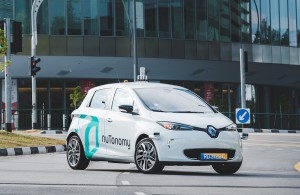
Starting today in Singapore, nuTonomy's robo-taxis will offer free rides as part of the company's ongoing research and development.
Just days after Uber announced it would be encouraging folks to get free rides in its autonomous ride-share vehicles in Pittsburgh, another company, nuTonomy, began a limited public trial of its “robo-taxi” service in Singapore: For free.
Using a Renault Zoe or Mitsubishi i-MiEv electric vehicle – with an emergency “engineer” behind the wheel – a select group of users are being offered free rides as part of the company’s ongoing research and development, which began in April.
“This is really a moment in history that’s going to change how cities are built, how we really look at our surroundings,” nuTonomy executive Doug Parker told Reuters.
The service area covers a western Singapore high-tech business district, and nuTonomy researchers are hoping to get feedback ahead of a planned full launch of the service in 2018. The full launch would include more than 100 taxis.
By providing free rides, the company hopes to gain further insight and then improve the software system performance, vehicle routing efficiency, the vehicle booking process, and the overall passenger experience.
“nuTonomy’s first-in-the-world public trial is a direct reflection of the level of maturity that we have achieved with our AV software system,” said Karl Iagnemma, CEO and co-founder of nuTonomy.
(Uber, Volvo team up for free autonomous rides. Click Here for the story.)
“The trial represents an extraordinary opportunity to collect feedback from riders in a real-world setting, and this feedback will give nuTonomy a unique advantage as we work toward deployment of a self-driving vehicle fleet in 2018.”
In addition to Singapore, nuTonomy is operating self-driving cars in Michigan and the United Kingdom, where it tests software in partnership with major automotive manufacturers such as Jaguar Land Rover.
(Click Here for details about Uber’s testing of autonomous vehicles.)
Iagnemma’s company isn’t the only one trying to master the art and science of autonomous ride-sharing. Swedish automaker Volvo AB and Uber entered into a $300 million alliance with to develop a driverless vehicle.
It will begin offering free rides in Pittsburgh sometime next month. Automakers and suppliers are also looking to get their piece of the pie. Google’s long-standing efforts are well chronicled, including its recent expansion into Phoenix, Arizona, for testing.
(Ford planning to launch first driverless car by 2021. For more, Click Here.)
Israeli tech company Mobileye NV is working with Delphi Automotive to have an autonomous system ready for production by 2019, while Ford Motor Co. said its self-driving car was slated for 2021.
